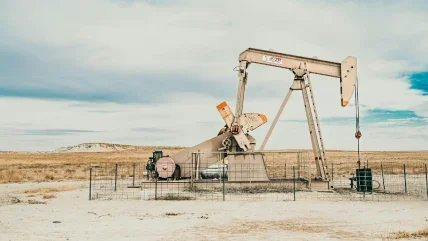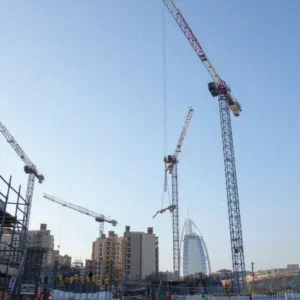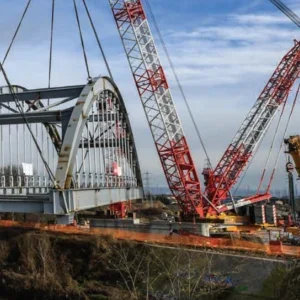
Fossil fuels, whatever we may wish, have not yet been phased out; and it does not seem that they are going to be phased out any time soon.
Exploration and extraction are still major industries, attracting investment and effort – and lifting machinery. It remains a global enterprise but the focus of it, psychologically and in dollar terms, remains the Middle East.
As evidence of the above, consider the recent mergers, expansions and joint ventures in the sector, and in the region – which are plentiful.
In May this year UAE-based heavy lift and transport company Al Faris, for example, signed a long-term contract with Saudi Total Petroleum Products.
The undertaking is to supply a complete range of products for ensuring reliable and smooth operation of the oil company’s state-of-the-art fleet of mobile cranes, crawler cranes, generators, forklifts and compressors.
Al Faris is expanding also in UAE; indeed, Kieve Pinto, the company's executive director, has emphasised the symbiosis between the company’s long-term expansion in UAE and the oil and gas sector. As he said in May, “The milestones the company has achieved over the past three decades have been in parallel to the major hydrocarbons and infrastructure developments witnessed in the country.”
Today, Al Faris has the largest fleet of cranes and heavy equipment in the Middle East.
This includes around 2,500 cranes and heavy equipment with an asset value exceeding $1.5 billion.
Heavy lifting is one essential for the oil and gas industries; moving large and heavy cargo modules from dockside to project site is another. Al Faris already has the largest onland transportation fleet in the UAE; it is now in the process of acquiring marine assets for transport of outofgauge cargo. And the company is investing more into its energy division: “Industrywise, 6070% of our work comes from the oil and gas sector, and it will continue to dominate in years to come” says Pinto.
As confirmation of its commitment, Al Faris is expanding its fleet with 27 Liebherr mobile cranes ordered for delivery in 2023 and 2024. The deal was struck at Bauma 2022. The order follows 24 mobile cranes, with lifting capacities from 110 to 700 tonnes, delivered by Liebherr in 2022.
The new order includes six additional LTM 13006.3s. “The concept of the LTM 13006.3, with its 90metre telescopic boom combined with compact dimensions, is perfect for universal operations here in the Middle East, especially in the energy sector,” said Al Faris shareholder Keonne Pinto.
Current traditional energy projects includes work on the upcoming Borouge expansion, which is a multibilliondollar processing plant in Ruwais, and on pivotal projects such as the Hail and Ghasha sour gas offshore development projects (sour gas is gas that contains hydrogen sulphide.) All of these are in Abu Dhabi.
Transportation of outsized components is also part of Al Faris's Middle East oil sector offerings (see box on p40).
It is interesting to note that the company is not entirely reliant on the fossil fuel sector for its business: it has been involved also in what it describes as ‘important’ sustainable energy projects. Al Faris's Renewable Energy and Energy Solutions company was established in 2019, as a company specialising in the field of renewable energy systems.
Solar farms are among the projects it has been involved in.
Similarly, Turkish-based lifting and transport specialist Hareket Heavy Lifting and Project Transportation is another company seeking to expand in the sector. Hareket has formed a partnership with Milaha, an integrated logistics solutions provider based in Doha, Qatar. The partnership is designed to offer customers in the energy, infrastructure, and industrial sectors a full range of end-toend heavy lifting and project transportation services, from planning to delivery.
“This is an exciting opportunity for us to expand our services and offer our customers a wider range of services” said Hareket CEO Abdullah Altunkum. “Our collaboration with Milaha will bring significant benefits to our customers as we work together to offer comprehensive heavy lifting and project transportation services in Qatar."
It is not just Middle Eastbased companies that are seeking to expand there. Terex, which manufactures its rough-terrain cranes in Crespellano, Italy and its Franna-brand pick and carry cranes in Australia, in February appointed a distributor for both these brands in Oman. The partnership is with construction equipment distributor International Integrated Equipment (IIE).
At the signing ceremony at IIE’s office in Muscat Ajit S. Nair, head of sales, Middle East & Asia, Terex rough terrain cranes and Franna pick and carry cranes, said, “The Middle East is an important region for Terex in terms of current and future potential. We have been a leading crane brand in the Middle East region for many years and to enhance our capabilities even further and to serve customers better we have a clear strategy of going with the distribution model. IIE, a Suhail Bahwan Group company, is a highly reputed organisation, has the market know-how and is focussed on customer service. We are delighted to have them as our partner in the Sultanate of Oman.”
In May, Terex also launched a new rough terrain model: the TRT 65. It is a machine that the company describes as ‘excelling in complex refinery environments’. They also say it is a durable, offroad crane that caters to various applications, in which they include construction, infrastructure and energy. All of these, of course, are a staple of the current Middle East.
All-terrain cranes are also a standard for oil work. In May this year Galfar Al Misnad, a leading construction company in Qatar, ordered a pair of Grove GMK4100L-2 all-terrain cranes through local Manitowoc dealer Mannai Trading. These are four-axle, 100 tonne capacity machines that deliver compact size and power. Their width is only 2.55 m and they have Megatrak suspension which allows them to manoeuvre easily into and out of position on job sites.
Galfar Al Misnad has been using Grove cranes for over 18 years; its fleet already has an array of allterrain and rough-terrain cranes at its newly-built plant and equipment workshop in Doha, where one of the new Groves arrived before deployment on its first job at Ras Laffan, assisting in the construction of a gas pipeline as part of the local North Field Expansion Project. The second GMK4100L-2 from the order will be sent to the same project once it reaches Qatar.
SIZE MATTERS
Large crawlers are also part of the Middle East energy sector scene, including its offshore operations. Al Jazeera Shipping Co. W.L.L has been active in both the maritime and the offshore and oil industries for over 45 years and is one of the largest marine operators in the Gulf region: its fleet of over 150 units includes tugs, barges and other equipment of various types and sizes.
The company recently extended its lifting fleet with Liebherr’s brand new LR 1400 SX crawler crane. It is the first company in the Gulf to do so.
Back in early 2022, Ali Hasan Mahmood, managing director of Al Jazeera Shipping, commonly known under his alias 'the king of barges', expressed his desire to renew one of his used older generation crawler cranes. The 400-tonne LR 1400 SX has a superior load curve and safety ratings; his decision to go with Liebherr, says the company, was driven by the model’s short assembly time, its preselection feature of individually customised load charts and, in particular, its capability to preselect barge inclinations, which automatically applies the permitted load curve. The LR 1400 SX has recently been commissioned and since May 2023 has been working with Bapco and its refinery in Bahrain. The company is hoping for more Liebherr crawler crane purchases to come.
Large Tadano crawlers are also being used in the region. At the start of the year Kuwaiti construction contractor NBTC ordered the new Tadano CC 88.1600-1 lattice boom crawler. NBTC is familiar with the brand: “We have numerous Tadano all terrain cranes in our fleet, and also three lattice boom crawler cranes, two of them CC 38.650-1 and a CC 24.400 1, that have demonstrated their reliability and performance for years now,” said Group Chairman K. G. Abraham. “The CC 88.1600-1 crawler we have ordered has a maximum capacity of 1600t and an enormous load moment of close to 27,500 tonne-meters, which makes it a significant upgrade for our fleet.”
One reason for the order was to take care of an upcoming large-scale project, meaning that extremely demanding work is already awaiting the crane and its debut. The group will be using the CC 88.1600-1 for forthcoming projects in Kuwait and for all types of infrastructure and oil projects throughout the Middle East.
Moreover, with the crane, the company’s Equipment Division expands its equipment leasing offer for the Middle East. And even though the CC 88.1600-1 is not NBTC’s first Tadano crane, the purchase still marks a first: it is the first brand-new Tadano to join the company’s fleet. It joins more than 200 cranes and 46 multi-axle liners, which put the group in a perfect position to cover the requirements of the oil and gas sector.
The Sparrows Group, headquartered in Aberdeen, is an engineering and maintenance service specialist for the global energy and industrial sectors, and it too is flourishing in its Middle East operations. The group has been awarded a major crane replacement contract for a client there. The project, which is worth $13m, is expected to last 18 months. The work will see Sparrows complete all aspects of the engineering required to replace four BOS Liebherr cranes of four offshore platforms, which are now beyond their expected operational life.
Sparrows will handle all crane interfaces, installation, commissioning and testing, as well as engineered lift plans for the removal and installation of the cranes using a lift barge, which is to be supplied by the main contractor, along with the new cranes. The project will be carried out in two phases, with phase one taking place onshore, from the company’s Abu Dhabi facility and workshop and phase two offshore.
“This is a significant contract win for us” said Charlie Topp, regional director for the Middle East, India, Caspian and Asia Pacific at Sparrows. “We have an extensive track record in the Middle East, and this contract reflects the confidence of operators and contractors in the region to utilise our expertise as part of safety critical work. As cranes age, it’s vital that maintenance is done to prolong their life, but in instances like this, where ongoing and frequent maintenance is impacting operations, it’s crucial that new infrastructure is deployed.”
Sparrows will undertake the majority of the work, but it has employed a local partner to undertake structural fabrication, electrical work, public address and general alarm systems, fire and gas systems and telecoms, as part of the full scope.
KUWAIT DEBUT
Sparrows has also been awarded work in Kuwait for the first time. The contract was announced in April: two scopes cover maintenance and provision of certificates of conformance for onshore rigs across sites for two clients. Sparrows will be responsible for servicing a range of critical drilling equipment, including mud pumps, iron roughnecks, catwalks and top drives, to ensure the rigs are safe to return to the field.
With Kuwait’s oil and gas industry now reinvigorated following a slump, 100 rigs will have joined the operational fleet by the third quarter of 2023. These rigs, both new and old, require high-quality servicing, which is a significant volume of work to place on existing OEMs. Sparrows has been recognised as an approved non-OEM maintenance provider. In this it becomes the first non-OEM service company to operate in the country and showcase its expertise and capabilities.
Stewart Mitchell, chief executive officer at Sparrows, said: “Becoming the first, and currently only, company to hold the approval as a non-OEM maintenance provider in Kuwait is a proud honour. This is an exciting time for our drilling services portfolio, as we expand globally, taking our remarkable success in the Middle East and Asia Pacific and replicating it in the UK and in previously inaccessible locations, such as Kuwait.”
With few western companies operating in Kuwait, Sparrows’ highly-skilled staff are sharing knowledge and supervising the client’s domestic maintenance teams as they carry out their CAT IV inspections.
Sparrows has also deployed a team including project managers, drilling equipment supervisors and drilling equipment technicians – including top drive, iron roughneck and BOP hoist specialists – with the numbers onsite increasing to support the growing workload.
On each rig, a quick turnaround of maintenance and servicing is required, with the country eager to kickstart its swelling oil and gas industry. Rigs require recertification every five years, which keeps the door open for Sparrows to remain operating in Kuwait for the foreseeable future.
So exploitation of fossil fuels, it seems, will not soon be going away in the immediate future.
Al Faris puts 30-metre vessel on 18-axle lines for tandem lift
Heavy haulage missions are an essential part of commissioning oil and gas plants. Al Faris was charged with moving and then erecting a 30-metre absorber vessel in Abu Dhabi.
“The vessel weighs 65.1-tonnes and is three metres in diameter. The path led from the Industrial City of Abu Dhabi to Mubarraz island, by road and marine transportation” said Revon Pereira, marketing executive at Al Faris.
The company used its fleet of Cometto SPTMs for the task. It includes 64 selfpropelled MSPE axle lines with an axle load of 48 tonnes, four 331kW Power Pack Units and numerous accessories. Due to the size of the item the team put together a trailer configuration with 18 axle lines.
The vessel arrived safely at the island. For erection on-site they made a tandem lift using two Liebherr mobile cranes, with lifting capacity of 800 tonnes and 200 tonnes respectively, to set it on its foundation.






